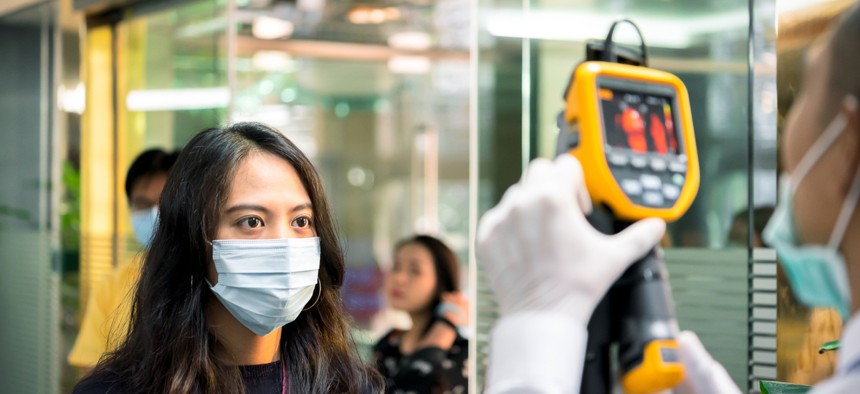Bipartisan Bill Would Require Passenger Temperature Checks at TSA Checkpoints

PongMoji/Shutterstock.com
Lawmakers aim to spur a fever-finding pilot program to measure the impacts.
Security checkpoints in certain American airports may soon involve an extra step that lawmakers hope could help shrink the spread of COVID-19: passenger temperature checks.
Reps. Ted Budd, R-N.C., Ralph Norman, R-S.C. and John Larson, D-Conn., on Thursday introduced the Healthy Skies Act, which would require the Transportation Security Administration to launch an experimental trial program to screen fliers for fever—a common coronavirus symptom—before passengers are permitted to proceed through security.
“The question is: how difficult would it be to use airport TSA checkpoints to identify people with a fever—and possibly COVID or some other contagious illness—and prevent them boarding a commercial flight and possibly putting others at risk?” Norman wrote in a blog post Thursday. “That’s what my bill today aims to find out.”
Specifically, the bipartisan legislation calls on TSA to pinpoint no less than 10 domestic airports that could implement a pilot program through which they use appropriate technologies to check passengers’ temperatures during the security screening process. Those who are experiencing temps above 100.4—the Centers Disease Control and Prevention’s threshold for a fever—would not be allowed to proceed to their flights. Exceptions for people with medical conditions that result in high temperatures are included in the bill.
In his blog post, Norman acknowledges that temperature screening will not identify COVID-19 carriers who do not exhibit symptoms. Nevertheless, he said the legislation’s intention is twofold. First, it would discourage and stop travelers that might unknowingly be infected from putting others at risk. “And second, it will allow Congress and health officials to better understand the degree to which TSA checkpoints could serve, in some limited capacity, as a way to help mitigate the spread of COVID-19 and future pandemics,” the lawmaker wrote.
Upon introduction, the legislation was referred to the House Committee on Homeland Security.
It comes on the heels of a letter Reps. Budd, Norman and others sent to White House Chief of Staff Mark Meadows urging the administration to introduce a measure among its COVID-19 response for TSA to “temporarily screen passengers for elevated temperatures.” Commercial aviation has historically helped to drive the American economy and is an essential component of U.S. business, commerce and society, motivating other lawmakers to also raise serious concerns about the impacts of contemporary air travel on the coronavirus’ strength and spread.
At a late June hearing hosted by the House Subcommittee on Space and Aeronautics focused on research and development “to support healthy air travel in the COVID-19 era and beyond,” Congress members and federal and academic expert witnesses reflected on their fears around mid-pandemic air travel and called on airlines and the government at-large to pursue more proactive measures to keep passengers and flight crews safe.
“If you go to foreign airports, there are measures in place to detect people’s temperatures, for example—we don't have that anywhere,” Rep. Zoe Lofgren, D-Calif., said during the hearing. “We could do an assessment … is that effective in the airports that use it? Is it something that we ought to implement? It doesn’t look like anyone is in charge of doing these assessments.”
Dr. Vicki Hertzberg, professor and director of a data science center at Emory University responded, “it's not a straightforward answer because people can be asymptomatic, sure, and have the virus and shed it and transplant it that way. So just taking temperatures alone is no guarantee.”
TSA’s Administrator David Pekoske recently voiced support for the federal government’s choice to refrain from checking fliers’ temperatures at security checkpoints. Still, many companies have seized the opportunity to produce fever-finding technology. And at least one state is taking initiative to implement passenger temperature screening on its own. On Thursday, Hawaii’s Transportation Department revealed that it’s teamed up with NEC Corporation of America and Infrared Cameras Inc., in a multi-million dollar effort to install thermal temperature screening and facial imaging technology across the state’s public airports as a preventative measure against COVID-19.
“We recognize that temperature screening won’t catch every infected passenger,” Hawaii Governor David Ige said in an announcement. “But it is an available tool that can be implemented and combined with the additional measures the state is providing to help prevent the spread of this virus, while helping rebuild the economy.”






